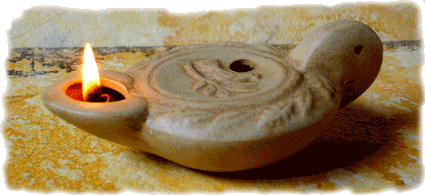Hanukkah began last Saturday night, perfect timing for my family and friends to
gather together for our yearly Hanukkah celebration in New Jersey.
Not a particularly observant man, my father made a strange but beautiful request. He asked if we could do havdalah, the Saturday night ritual that separates Shabbat from the rest of the week. Well, doesn't he know how to get his rabbi daughter excited! "I'll bring the candle," I told him, "you grab some cheap wine and throw together some spices."
Saturday night arrived and we gathered. The Batons, our dear friends, joined us per family tradition. The kids looked quizzically at the yellow braided candle. "It looks like bread!" "It looks like pasta!" I explained the significance of each of the symbols and of havdalah itself. Mark and I sang the blessings, drawing us near to the end of the ritual.
Candle
burning with a mighty flame, I explained, "Now we're going to get very,
very quiet. If you listen carefully enough, as I extinguish the candle in
the wine, you'll be able to hear the Sabbath leave our presence."
The room drew quiet, eyes were pinned on the blazing candle. I
tipped it slowly into the wine glass...and just before it could hit the wine to
create it's one of a kind sizzle...just before the light went out…"beep!
beep! beep!"...the fire alarm went off. And thus Shabbat ended with
a siren, and not a sizzle.
We
all erupted into laughter, which turned out to be a great way to lead into the
Hanukkah blessings and lighting the Hanukkiah. Luckily it was only night one
and we had little fears of what the menorah would mean for the now-sensitive
fire alarm.
The whole funny incident made me think about how we use fire in our tradition. Fire comes around a lot, mostly because it is full of rich symbolism. There's the obvious light metaphors. “This little light of mine, I'm gonna let it shine”-type sentiments.
Consider the other fires we meet, though. The fire of the Temple sacrifices, the pillar of fire God used to lead the Israelites through the black nights in the wilderness, the fire of prophetic vision, and, of course, the fire of the burning bush...the fire that burns but does not consume.
consume.
That fire in particular represents God manifest in the world. It reminds us of God's enormous power - the power to warm and inspire, but also the power to burn and destroy. Our tradition teaches that the way we harness this Divine power makes all the difference. Will you use it to provide light in the darkness or will you use it to burn things down?
The whole funny incident made me think about how we use fire in our tradition. Fire comes around a lot, mostly because it is full of rich symbolism. There's the obvious light metaphors. “This little light of mine, I'm gonna let it shine”-type sentiments.
Consider the other fires we meet, though. The fire of the Temple sacrifices, the pillar of fire God used to lead the Israelites through the black nights in the wilderness, the fire of prophetic vision, and, of course, the fire of the burning bush...the fire that burns but does not
 consume.
consume.That fire in particular represents God manifest in the world. It reminds us of God's enormous power - the power to warm and inspire, but also the power to burn and destroy. Our tradition teaches that the way we harness this Divine power makes all the difference. Will you use it to provide light in the darkness or will you use it to burn things down?
That
is what Hanukkah is about. The Greeks possessed a great fire – the fire
of war. They used their fire and
power to destructive ends. They scorched the land and burned the Temple
in order to torture the people. They wielded it large and without
control.
The Maccabees, though, they found fire in the smallest of places - one tiny cruse of oil. They took the smallest amount of fire and kindled it into eight days of hope. They used
it to bring joy back into the world - not wipe it out.
They used
it to bring joy back into the world - not wipe it out.
May we create that sort of fire tonight. May these hanukkiyot that illuminate our sanctuary remind us of the Divine power that resides within each of us, and our obligation to use it wisely and carefully. May we kindle it large enough to sound the alarm against indifference, hatred, and destruction. From the smallest spark may we blaze a light of love. Kein yhi ratzon.
The Maccabees, though, they found fire in the smallest of places - one tiny cruse of oil. They took the smallest amount of fire and kindled it into eight days of hope.
 They used
it to bring joy back into the world - not wipe it out.
They used
it to bring joy back into the world - not wipe it out.May we create that sort of fire tonight. May these hanukkiyot that illuminate our sanctuary remind us of the Divine power that resides within each of us, and our obligation to use it wisely and carefully. May we kindle it large enough to sound the alarm against indifference, hatred, and destruction. From the smallest spark may we blaze a light of love. Kein yhi ratzon.

No comments:
Post a Comment